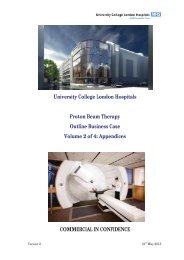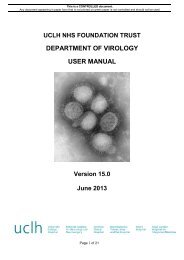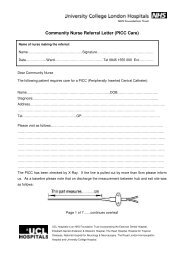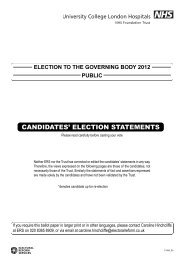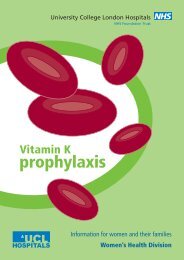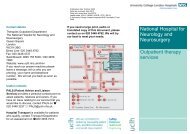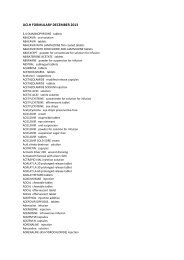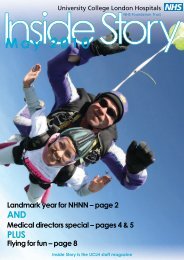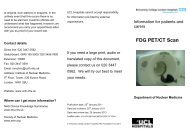Noro virus - University College London Hospitals
Noro virus - University College London Hospitals
Noro virus - University College London Hospitals
You also want an ePaper? Increase the reach of your titles
YUMPU automatically turns print PDFs into web optimized ePapers that Google loves.
Publication date: March 2008<br />
Last review date: December 2013<br />
Next review date: December 2015<br />
Leaflet code:<br />
UCLH/MB/INF/IC/NORO/2<br />
Re-order code:<br />
UCLH0288<br />
© <strong>University</strong> <strong>College</strong> <strong>London</strong> <strong>Hospitals</strong> NHS Foundation Trust, Unique Code: 28939<br />
• Staff and visitors should wash their hands<br />
with soap and water before and after being<br />
with a patient with noro<strong>virus</strong> infection or<br />
their surroundings.<br />
• Cleaning of ward areas and the toilets is<br />
increased. This will help remove the <strong>virus</strong><br />
from the environment and decrease the risk<br />
of infection in others.<br />
• If a patient or visitor has a bout of diarrhoea<br />
or vomiting anywhere in the hospital please<br />
mention this to the staff in charge, as we<br />
will give the toilets an extra clean.<br />
• Visiting may be restricted. Visitors to a ward<br />
where there are cases on noro<strong>virus</strong>, are<br />
at risk of catching the infection. <strong>Noro</strong><strong>virus</strong><br />
is very infectious and may spread despite<br />
measures. Children, frail or elderly should<br />
avoid visiting if possible.<br />
• Visitors are asked not to visit if they or other<br />
members of their household have had<br />
diarrhoea and/or vomiting within the past<br />
48 hours. They should delay coming into<br />
hospital until they are better.<br />
• If possible, the patient will not be moved<br />
to another ward, hospital or clinic until the<br />
infection has cleared up.<br />
Treating it<br />
There is no specific treatment for noro<strong>virus</strong>.<br />
The illness generally gets better on its own<br />
after two days. Antibiotics do not work because<br />
they kill bacteria not <strong>virus</strong>es. It is important to<br />
drink plenty of fluids to prevent dehydration.<br />
There is no vaccine to prevent the infection.<br />
Leaving hospital after noro<strong>virus</strong><br />
A patient with noro<strong>virus</strong> infection will generally<br />
not be discharged from hospital until the<br />
diarrhoea has resolved completely. If there is<br />
a recurrence of diarrhoea a patient should see<br />
their general practitioner.<br />
For further information<br />
Please contact the Infection Control Team<br />
on: 0845 155 5000 extension 79716.<br />
Or you can go to the following websites:<br />
The Department of Health<br />
Website:<br />
www.dh.gov.uk/hcai<br />
The Health Protection Agency<br />
Website:<br />
www.hpa.org.uk<br />
NHS Direct<br />
Website:<br />
www.nhsdirect.nhs.uk<br />
If you would like this information in another<br />
format, for example, large print, or audio, or<br />
the services of a translator please contact us<br />
on the number above.<br />
Arabic<br />
إذا آنت بحاجة إلى الحصول على هذه المعلومات في صيغة أخرى، على سبيل المثال، طباعة آبيرة أو تسجيل<br />
صوتي، أو آنت بحاجة إلى خدمات مترجم تفضل بالاتصال بنا على الرقم الموضح أعلاه.<br />
Bengali<br />
Cantonese<br />
倘 若 您 需 要 本 資 訊 以 另 一 種 格 式 提 供 , 如 大 字 體 或 音 訊 格 式 , 或 需 要 翻 譯 服<br />
務 , 請 按 照 上 述 號 碼 聯 絡 我 們 。<br />
Farsi<br />
Mandarin<br />
如 果 您 需 要 本 资 料 以 另 一 种 格 式 提 供 , 如 大 字 体 或 音 频 格 式 , 或 需 要 翻 译 服<br />
务 , 请 按 照 上 述 号 码 联 系 我 们 。<br />
Polish<br />
Prosimy się z nami skontaktować pod podanym powyżej numerem telefonu,<br />
jeśli chcieliby Państwo otrzymać niniejszą informację w innym formacie, np.<br />
w formacie dużym drukiem, w postaci nagrania dźwiękowego lub skorzystać<br />
z usług tłumacza.<br />
Portuguese<br />
Caso pretenda esta informação noutro formato, por exemplo num formato<br />
ampliado ou em áudio, ou caso precise dos serviços de um tradutor, deverá<br />
contactar-nos pelo número acima.<br />
Somali<br />
Haddii aad macluumaadkan ku rabto hab kale; tusaale ahaan, far waawayn<br />
ama hab maqal ah, ama aad rabto adeeg tarjumaad leh fadlan nagala soo<br />
xidhiidh telefoonka kor ku xusan.<br />
Spanish<br />
Si necesita esta información en otro formato, como por ejemplo, en formato<br />
de imprenta grande o audio, o los servicios de un traductor, por favor<br />
póngase en contacto con nosotros en el número que aparece arriba.<br />
Turkish<br />
Bu bilgileri başka bir formatta, örneğin iri harfl erle veya sesli olarak, ya da<br />
tercüman yardımıyla almak isters<br />
<strong>Noro</strong><strong>virus</strong>
Brief facts<br />
• <strong>Noro</strong><strong>virus</strong> causes vomiting and diarrhoea.<br />
• It is sometimes called ‘winter vomiting<br />
disease’.<br />
• The <strong>virus</strong> is very easily spread by contact with<br />
infected vomit or diarrhoea; or by touching<br />
surfaces or objects which are contaminated<br />
with the <strong>virus</strong>, or by consuming food or drink<br />
which has been contaminated with the <strong>virus</strong>.<br />
• Outbreaks of noro<strong>virus</strong> are common in<br />
places such as nursing homes and hospitals.<br />
• Handwashing with soap and water and<br />
isolation are important for preventing<br />
the spread.<br />
• <strong>Noro</strong><strong>virus</strong> is rarely serious.<br />
The main symptoms are:<br />
• nausea and vomiting<br />
(often sudden and severe)<br />
• diarrhoea<br />
• stomach cramps.<br />
Some people may also have:<br />
• a fever (a high temperature)<br />
• headache<br />
• muscle aches<br />
• tiredness.<br />
Although unpleasant it is rarely dangerous.<br />
Most people start feeling ill within a day or two<br />
of catching it. Usually symptoms last for one to<br />
two days and most people make a full and<br />
speedy recovery. There are no long-term<br />
effects from noro<strong>virus</strong> infection.<br />
How it spreads<br />
<strong>Noro</strong><strong>virus</strong> is very infectious. It can spread<br />
very easily and quickly from one person to<br />
another. The infection can be spread from<br />
the moment a person fi rst feels ill, until two<br />
days after they feel better. Someone with a<br />
noro<strong>virus</strong> infection remains infectious for up<br />
to 48 hours after the symptoms have ended.<br />
Infection can spread easily in areas where<br />
there are large numbers of peoples such as<br />
hospitals, nursing homes, schools and cruise<br />
ships. In hospitals it can affect patients, staff<br />
and visitors.<br />
The <strong>virus</strong> is passed on in an infected<br />
person’s vomit or diarrhoea. So it can be<br />
caught in a number of ways:<br />
Preventing the spread of noro<strong>virus</strong><br />
When there are high levels of this infection<br />
in the community, it is very difficult to prevent<br />
patients, staff and visitors bringing the infection<br />
into hospital. The <strong>virus</strong> spreads quickly and<br />
easily and not all infections can be prevented.<br />
<strong>Noro</strong><strong>virus</strong> can disturb the normal working of the<br />
hospital and causes distress to those infected<br />
and their friends and families. Particular<br />
attention to good hygiene measures should be<br />
observed during outbreaks.<br />
Several measures will be taken to prevent<br />
the spread:<br />
• Patients with noro<strong>virus</strong> are isolated. This<br />
is to prevent other patients, visitors or<br />
staff becoming infected. A patient may be<br />
looked after in a single room.<br />
• There are no medicines to treat noro<strong>virus</strong>.<br />
Healthy people get better within a couple of<br />
days, frail, elderly or ill people may<br />
take longer.<br />
About noro<strong>virus</strong><br />
<strong>Noro</strong><strong>virus</strong> is the most common cause of<br />
infectious gastroenteritis (diarrhoea and<br />
vomiting) in England and Wales. It is estimated<br />
that noro<strong>virus</strong> affects between 600,000 and<br />
a million people in the UK each year. There<br />
is usually a peak of noro<strong>virus</strong> infection during<br />
the winter months and it has been called the<br />
“winter vomiting disease”.<br />
Patients at risk<br />
<strong>Noro</strong><strong>virus</strong> infection affects people of all ages.<br />
The very young and elderly should take<br />
extra care if infected, as dehydration is more<br />
common in these age groups and may need<br />
hospital treatment. People do not become<br />
immune to <strong>Noro</strong><strong>virus</strong> and may have it many<br />
times in their lifetime.<br />
Testing for it<br />
In hospital any patient who becomes ill with<br />
diarrhoea or diarrhoea and vomiting will<br />
have a sample of diarrhoea sent to a<br />
laboratory for testing. It usually takes one to<br />
three working days to get the results.<br />
By being with an infected person. This can<br />
happen if you are looking after someone who<br />
is ill. So patients, nurses, carers and parents<br />
are particularly at risk. You can also catch it<br />
by sharing, for example, food or cutlery.<br />
By eating contaminated food. You can catch<br />
the infection by eating or drinking something<br />
with the <strong>virus</strong> in it.<br />
By touching surfaces or objects that have the<br />
<strong>virus</strong> on them. You can get the <strong>virus</strong> on your<br />
hands (and not see it) by touching, for<br />
instance, a cup or toilet used by an infected<br />
person. Then, by touching your mouth, the<br />
<strong>virus</strong> can spread into your body.<br />
• If a number of patients are ill at the same<br />
time, they may be looked after together in<br />
one part of the ward.<br />
• If a large number of patients are affected<br />
the ward may even be closed to new<br />
patients until the infection has cleared up.<br />
• If a patient has noro<strong>virus</strong> infection it may<br />
be necessary to delay some planned<br />
investigations or operations until they are<br />
feeling better.<br />
• Alcohol hand gel has limited effect on<br />
noro<strong>virus</strong> therefore hands must be washed<br />
with soap and water.



